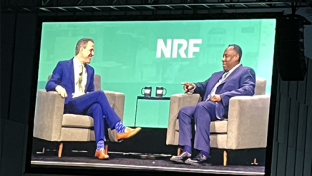EXCLUSIVE: What’s Driving WK Kellogg’s New Business Strategy?
Earlier this month, WK Kellogg Co. shared details of its new sustainable business strategy, coined “Feeding Happiness.” The announcement came nearly a year after the former Kellogg. Co. first announced a plan to split into cereal company WK Kellogg Co. and snacking company Kellanova.
“Feeding Happiness” reflects and aligns with the vision of founder W.K. Kellogg, an early conservationist and proponent of well-being. The strategy is a three-pronged approach centered on the intent to “Make Eating Well Easy,” “Help Kids Be Their Best” and “Better Our Communities.” Among other goals, the framework is designed to increase the number of people reached through feeding initiatives, provide children with learning and play opportunities and advance the company's science-based sustainability targets.
Recently, Progressive Grocer talked with Sarah Ludmer, chief wellbeing and sustainable business officer at Battle Creek, Mich.-based WK Kellogg Co., about the genesis of the strategy and how the company is bringing it to life with stakeholders including grocers, shoppers and community members.
Progressive Grocer: How does a holistic approach inform your Feeding Happiness strategy?
Sarah Ludmer: It’s 100% of us as an independent 118-year old startup. We joke about that, but with our split, the overall sustainable business strategy of "Better Days" stayed with Kellanova. That left us to figure out our sustainable business strategy.
WK was one of the first philanthropists, environmental stewards and well-being visionaries, and the food he made and how he shared it with the world is what we are now trying to think through. The problems that exist in hunger, the planet and health are interconnected, and we don’t want to look at them as siloed. When we are doing regenerative agriculture, for example, we want to be sure it’s thinking through nutritional quality, too.
PG: How did you come up with the name?
SL: One thing I loved, and the whole leadership team loved, was when we were thinking through words and what they mean, a lot of programs are outcome-based, but we wanted a word that showed action. You have to feed it every single day, and that’s what we want our employees thinking. So when they are creating food, changing a line at a plant or something else, they think, "What is the impact on people and planet?” It is fundamental and action-oriented.
PG: How does your core cereal business reflect these three pillars of sustainable business?
SL: We were one of the earliest health and wellness types of foods, and we have to remind people of the impact of the cereal category on health and sustainability. Cereal continues to be a top contributor of nutrients like vitamin D and fiber, and it’s all under $1 a bowl with milk. We are also innovating cereals that are higher in protein and some that are lower in sugar.
[RELATED: Getting the Word Out on Breakfast]
It’s about helping this category continue to make a positive impact. With the food itself, we think, "How are we driving access?" and "How does the food itself deliver key nutrients in formats people love"? Also, we’re helping kids be their best, and that comes through marketing programs focused on things like reading and sports, and through partnership with other groups. The third bucket is bettering our communities, and especially now, as a smaller organization, we get laser-focused on where we live and work. We know in those communities that environmental impact is important.
PG: You have a strong emphasis on helping and inspiring young people, from supporting young farmers to funding kids in sports to feeding children. Why is this a priority for the company and its brands?
SL: It does go back to our roots, to WK. He said that one of the best things we can do is to make lives of children healthier, happier and more promising. He felt our future was in the hands of our kids. To stand the test of time, you have to protect your resources – if you are not protecting your resources, you won’t have a more promising future.
PG: How are you working with grocers to amplify your new Feeding Happiness strategy?
SL: We shared the platform at FMI Midwinter, and we will be actively reaching out to retailers. We are building on some great history, too, built into retail programs at the previous Kellogg Co. Also, we think there is huge power in this category – cereal is still one of the top five categories in the store and we can work together to get the category on track.








